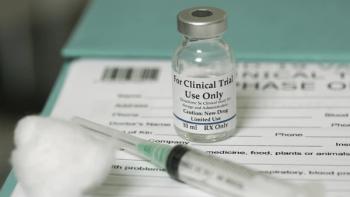
Diet review: Picking the best diet for your patients
Having a family with medical issues, primarily gastrointestinal issues, combined with the difficulty that comes with timely diagnosis, has taught me quite a bit about diets. We have tried many diets in an effort to calm stomach pains as well as reduce inflammation and certainly found truth in the adage, “You are what you eat.”
The views expressed here belong to the author. They do not necessarily represent the views of Optometry Times or UBM Medica.
Having a family with medical issues, primarily gastrointestinal issues, combined with the difficulty that comes with timely diagnosis, has taught me quite a bit about diets. We have tried many diets in an effort to calm stomach pains as well as reduce inflammation and certainly found truth in the adage, “You are what you eat.”
I came across an article on diet which reported, “According to a 2015 study, over 71% percent of medical schools failed to meet the recommended National Research Council goal of providing at least 25 hours of nutrition education to medical students.”1
I do not remember much about nutritional education in optometry school. I think it was limited to “diabetics should not eat sugar” and “eat fish.” So, I have taken it upon myself to review it for you here, while eating carrots, drinking water, and riding my exercise bicycle with a built in desk.
Previously from Dr. Schroeder-Swartz:
The most common doctor prescribed diets are:2
• DASH
• FODMAP
• Mediterranean
• MIND
• Weight Watchers
DASH diet
If you thought it was Weight Watchers, you have been brainwashed by your television. The correct answer is the DASH diet. “DASH” stands for Dietary Approaches to Stop Hypertension, and it is the diet most commonly prescribed by physicians. The diet emphasizes limiting salt while eating whole grains, fruits, and vegetables.
Related:
The DASH diet includes foods high in protein and fiber along with low-dairy foods. It is low in saturated fats, total fats, and cholesterol, as well as low in sugar so it is good for diabetic patients as well.
A guide to this diet can be found here: https://www.nhlbi.nih.gov/files/docs/public/heart/hbp_low.pdf.
Mediterranean diet
The Mediterranean diet may be suggested to those with cardiovascular disease. This diet requires you to love eating plants. Increasing consumption of fruits, vegetables, whole-grain breads and cereals, beans, nuts, and seeds is also a requirement. Increased intake of omega-3 fatty acids such as walnuts, and flaxseeds, and fish is important.
Most meals are cooked using only olive oil, a monounsaturated fat that is rich in polyphenols. Polyphenols reduce inflammation.3
Patient information on this diet can be found here: http://www.mayoclinic.org/healthy-lifestyle/nutrition-and-healthy-eating/in-depth/mediterranean-diet/ar047801
Related:
Diet recommendations for diabetic patients
Because we often see patients with diabetes, I have an update. The 2013 American Diabetes Association (ADA) guidelines include the following recommendations for people with diabetes4:
• Limit or avoid beverages containing sugar or any caloric sweetener. Many yummy drinks include high-fructose corn syrup and sucrose, including energy drinks, flavored vitamin waters, and fruit drinks. That includes sweet tea, for everyone in the South, and sodas for ya’ll up North.
• High-fiber, nutrient-dense sources of carbohydrates should be chosen over processed foods with added fat, sugar, and sodium.
• Reduce sodium intake to <2300 mg/day, unless you have hypertension; then reduce it even more.
• Two servings of fatty fish twice per week, at least. Omega-3 supplements were not supported.
• Choose liquid fats instead of saturated or trans-fat varieties, and consume leaner sources of protein (poultry, nuts, beans, fish).
• Vitamin or mineral supplements in individuals who do not have a vitamin or mineral deficiency were not supported. No evidence has been found that the various supplements that report to enhance blood sugar metabolism actually work. Cinnamon does enhance breath, however.
Related:
For those with diabetes and kidney disease, diets to reduce the amount of waste in their blood may be beneficial, but you should refer these patients to a nutritionist if they have not been referred already. Increased waste negatively affects electrolyte balance, resulting in progression of renal disease.
In early stages, restriction of protein intake may be recommended to avoid high levels of urea, protein products, and amino acids in the bloodstream. These patients should select high-quality proteins, such as poultry, eggs, fish, beans, and dairy-and limit red meat. Processed meats should be avoided.
FODMAP diet
The FODMAP (fermentable oligosaccharides, disaccharides, monosaccharides and polyols) diet, is an elimination diet that may be suggested for patients with inflammatory bowel disease (IBD) and irritable bowel syndrome (IBS).
This diet requires restriction of certain carbohydrates, including fruits rich in fructose, dairy products, and several artificial sweeteners.
Related:
It is difficult to adhere to, and not all those with GI symptoms respond to it. Forbidden foods include:
• Apples
• Asparagus
• Brussel sprouts
• Broccoli
• Onions
• Peaches
• Peas
• Pistachios
• Rye
• Wheat
• Watermelon
• Avocado
•Cherries
• Honey
• Mushrooms
• Nectarines
• Pears
• Peaches
• Plums
• Artificial sweeteners (sorbitol, mannitol, maltitol, xylitol)
• Dairy products such as milk, soft cheeses, custard, ice cream, and yogurt.
Related:
Let’s consider what is left: kale and water.
This is my least favorite diet.
Gluten-free diets
Celiac disease may be a concern for our patients as well. This is a genetic autoimmune disorder in which patients are instructed to avoid ingesting gluten. In case you have not noticed the increasing “gluten free” section of your grocery store, gluten is a protein found in grains such as barley, wheat, and rye.
In these patients, ingestion of gluten causes the immune system to attack its own small intestine. More information can be found here: https://celiac.org/live-gluten-free/glutenfreediet/food-options/.
Related:
Diets for Alzheimer disease and dementia
The Mediterranean diet has been reported to improve cognitive function and reduction in the risk for dementia.5 The diet has also been associated with increased cortical thickness.6
The MIND (Mediterranean-DASH intervention for neurodegenerative delay) diet was created by researchers at Rush University Medical Center. It is a hybrid of the Mediterranean and DASH diets. It was reported to slow cognitive decline and reduce the risk of Alzheimer’s disease.
The diet recommends green leafy vegetables, berries, whole grains, poultry and fish, and a daily glass of red wine. More information can be found at: https://www.rush.edu/news/diet-may-help-prevent-alzheimers.
In our office, we measure the BMI on everyone. Now you can engage in conversation about a healthy diet and make suggestions to the patient’s primary care provider to promote overall health.
References
1. Adams KM, Butsch WS, Kohlmeier. The state of nutrition education at US medical schools. J Biomed Education. Available at:
2. Doheny K. DASH diet wins top spot again. WebMD. Available at:
3. Scoditti E, Calabriso N, Massaro M, Pellegrino M, et al. Mediterranean diet polyphenols reduce inflammatory angiogenesis through MMP-9 and COX-2 inhibition in human vascular endothelial cells: a potentially protective mechanism in atherosclerotic vascular disease and cancer. Arch Biochem Biophys. 2012 Nov;527(2):81-9.
4. American Diabetes Association. American Diabetes Association Releases New Nutritional Guidelines. Available at: http://www.diabetes.org/newsroom/press-releases/2013/american-diabetes-association-releases-nutritional-guidelines.html. Accessed 2/2/2017.
5. Petersson SD, Philippou E. Mediterranean Diet, Cognitive Function, and Dementia: A Systematic Review of the Evidence. Adv Nutr. 2016 Sep 15;7(5):889-904.
6. Staubo SC, Aakre JA, Vemuri P, et al. Mediterranean diet, micronutrients and macronutrients, and MRI measures of cortical thickness. Alzheimers Dement. 2017 Feb;13(2):168-177.
Newsletter
Want more insights like this? Subscribe to Optometry Times and get clinical pearls and practice tips delivered straight to your inbox.













































.png)


